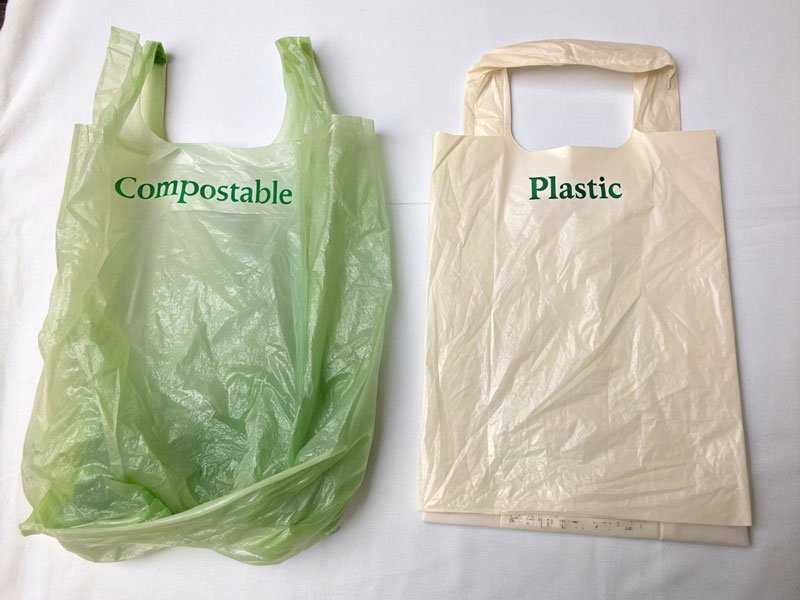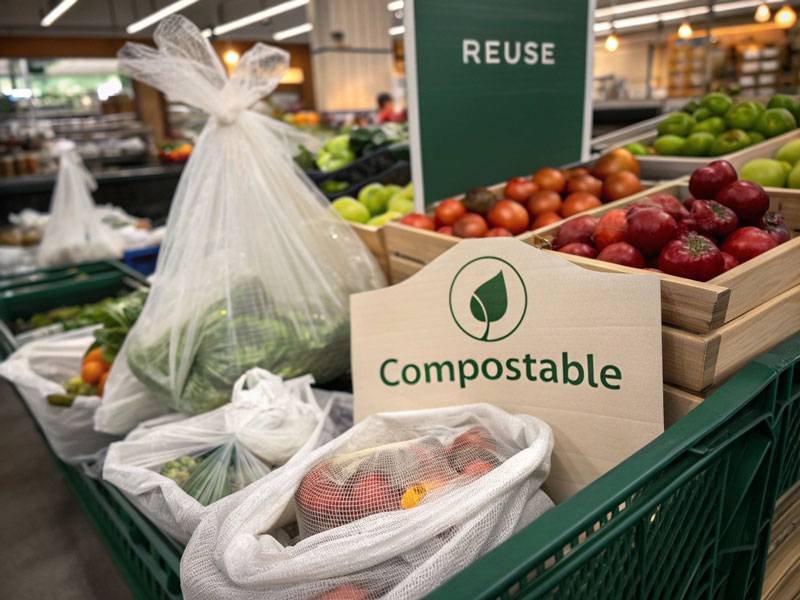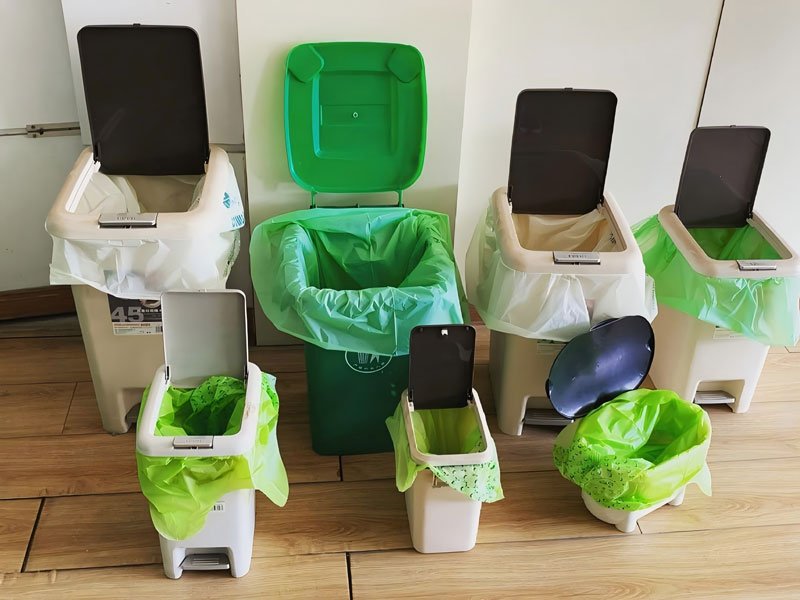As the world continues to face challenges like pollution and environmental degradation, individuals and businesses are looking for ways to reduce their carbon footprint. One important area where we can play a positive role is in waste management. Organic trash bags, also known as compostable or biodegradable trash bags, have become a key solution to promote sustainable development.
These eco-friendly alternatives not only help reduce pollution, but also offer a number of benefits for residential and commercial use.
In this blog, we’ll explore everything you need to know about organic trash bags, including their types, benefits, and how to choose the right one for your needs.
 compostable vs plastic bags
compostable vs plastic bags
What Are Organic Trash Bags?
Organic trash bags are used to handle biodegradable and compostable materials. Unlike regular plastic trash bags that take hundreds of years to decompose, organic trash bags are made from plant-based materials and are biodegradable or compostable. This means they can break down naturally and safely in the environment without causing harm to the earth.
Most organic trash bags are made from materials such as corn starch, potato starch, and other naturally degradable plant-based polymers. These bags are often used to handle food waste, garden waste, and other organic materials.
Benefits of Organic Waste Bags for Businesses
Businesses, especially those in the food service, hospitality, and retail sectors, can benefit significantly from switching to organic waste bags. Here are some key reasons why businesses should make the change:
Cost-Effectiveness: While organic waste bags may cost slightly more than traditional plastic bags, they can help businesses save money in the long run. Many businesses pay fees for waste disposal based on the volume of waste they produce. By using compostable or biodegradable bags, businesses can reduce the volume of plastic waste they produce, which may lower their disposal costs.
Brand Image: Consumers are becoming increasingly aware of environmental issues. By adopting sustainable waste management practices, businesses can enhance their brand image and appeal to eco-conscious customers. This can lead to increased customer loyalty and positive word-of-mouth advertising.
 reuse cycle diagram
reuse cycle diagram
Regulatory Compliance: As more cities and countries implement plastic bans or stricter waste management regulations, businesses using organic waste bags may avoid fines and penalties. Additionally, eco-friendly businesses are often eligible for tax incentives or environmental grants.
Sustainability Certifications: Adopting organic waste bags can help businesses earn sustainability certifications like LEED (Leadership in Energy and Environmental Design) or B Corp certification, which can further boost their reputation in the market.
Organic Waste Bags VS Traditional Plastic Bags:
-
Traditional plastic bags: Non-biodegradable and take centuries to decompose, contributing to environmental pollution.
-
Organic waste bags: Biodegradable or compostable, breaking down in a matter of weeks or months depending on environmental conditions.
With the growing awareness about the environmental impact of plastic waste, organic waste bags offer a practical solution for reducing our reliance on single-use plastics.
Why Switch to Organic Waste Bags?
Environmental Benefits:One of the main reasons to switch to organic waste bags is their minimal environmental impact. Traditional plastic bags contribute massively to plastic pollution, with millions of tons of plastic entering our oceans each year. These bags often end up in landfills or waterways, where they remain for decades without breaking down.
Organic waste bags decompose quickly, leaving no harmful residues behind. When used correctly, these bags can help reduce the amount of plastic waste in our landfills and oceans, contributing to a cleaner, healthier planet.
Composting and Waste Reduction: Many organic waste bags are compostable, meaning they break down into natural elements like water, carbon dioxide, and organic matter. This makes them perfect for composting organic waste. Whether you’re composting at home or running a large-scale composting operation, these bags can be easily included in the composting process, further reducing waste and enriching the soil.
Health and Safety: Organic waste bags are free from harmful chemicals and plastics, making them safer for both humans and animals. They don’t leach toxic substances into the environment, ensuring that your waste disposal is safer and healthier.
Regulatory Compliance: As environmental regulations tighten across the globe, many governments are pushing businesses and individuals to adopt sustainable practices. Using organic waste bags can help you comply with local waste disposal regulations and even qualify for environmental incentives or tax breaks.
 walmart kitchen garbage bags
walmart kitchen garbage bags
Types of Organic Waste Bags
When it comes to organic waste bags, there are two main types: biodegradable and compostable bags. Let’s break down the differences:
Biodegradable Organic Waste Bags: Biodegradable bags are designed to break down over time through the action of bacteria, fungi, and other microorganisms. These bags degrade faster than traditional plastic bags but may not fully break down into natural elements if they end up in a landfill without the right conditions (e.g., lack of oxygen).
Biodegradable bags are often made from plant-based materials or synthetic polymers that are designed to degrade more quickly than conventional plastic.
Compostable Organic Waste Bags: Compostable bags are a step further than biodegradable bags. These bags not only break down into natural elements but also turn into nutrient-rich compost when processed in the right conditions. Compostable bags typically meet strict standards like ASTM D6400 or EN 13432, ensuring that they decompose without leaving harmful residues behind.
The main difference between biodegradable and compostable bags is that compostable bags are specifically designed to break down into compost, which can be used to enrich soil. This makes them ideal for both home composting and industrial composting programs.
How to Choose Compostable Organic Waste Bags
For home use: If you’re composting at home, compostable bags are the best choice. They will break down quickly and contribute to the health of your garden.
For businesses: If your business deals with a large amount of organic waste, compostable bags are highly recommended. They help reduce waste sent to landfills and can be composted to create nutrient-rich soil.
Organic Waste Bags vs. Other Eco-Friendly Alternatives
| Waste Disposal Option | Advantages | Disadvantages |
|---|---|---|
| Reusable Bins | - Reduces waste overall. - Durable and long-lasting. |
- Does not address the need for disposable bags. - Less convenient for disposal. |
| Glass Containers | - Sustainable and recyclable. - Durable and long-lasting. |
- Heavy and expensive. - Breakable, making it less convenient for some users. |
| Paper Bags | - Biodegradable and can break down naturally. - Readily available. |
- Not always compostable. - Requires more resources to produce than plant-based organic bags. |
Organic waste bags are ideal for situations where you need a disposable solution for organic waste, such as in the kitchen, garden, or commercial settings. If you’re focused on sustainability, they are a better choice compared to other alternatives like plastic bags or non-compostable paper bags.

How to Properly Use Organic Waste Bags
Best Practices:
Use appropriate bags: Make sure you choose the correct size and type of organic waste bag for your needs. For example, small kitchen bags are perfect for food scraps, while larger bags are better for yard waste or commercial use.
Store waste properly: Organic waste like food scraps should be stored in a cool, dry place before being disposed of. If you're using compostable bags, ensure they’re not exposed to heat or sunlight, as this may cause them to break down prematurely.
Avoid non-compostable waste: Some organic waste bags can handle only specific materials like food scraps, paper, and yard waste. Avoid placing non-compostable items like plastic wrappers or certain chemicals in these bags.
Common Mistakes to Avoid:
Mixing non-biodegradable waste with organic waste: It’s important to only place compostable materials into organic waste bags. Mixing non-biodegradable materials can slow down the decomposition process and cause environmental harm.
Using organic waste bags in improper conditions: If organic waste bags are not exposed to the right conditions (e.g., oxygen, moisture, heat), they may not break down as quickly or completely.
Conclusion
Organic waste bags are an eco-friendly, practical solution for reducing plastic waste and promoting sustainability. Whether you’re looking for a way to manage waste at home or in your business, these bags offer numerous benefits, from environmental protection to cost savings.





